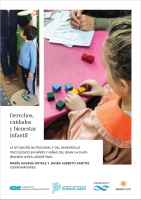Books2bits reading formats:
Free and open reading: links on the page of each book
PDFs direct sales (directs to a Google form)
E-books on Amazon
Printed at Servicop and bookstores distributor Bibliomanager
At the end of 2022, humanity reached the mark of eight billion people in the world. This fact led to different reflections on the maintenance of life on the planet: How to eliminate poverty and hunger? How to feed so many people in a dignified and equal way? How to guarantee the food sovereignty of countries? How to establish social justice in the face of inequality? How to guarantee a healthy life, healthy nutrition and well-being to all the inhabitants of the globe? How to promote a type of agricultural development that respects the ecosystem and all forms of life? Facing so many challenges that have arisen in the 21st century, it would be impossible not to question what is the real planetary capacity to maintain and nourish the world population in the face of the expansion of economic systems that do not favor the health and well-being of their citizens, and that do not respect the biodiversity. The forests, animals, rivers and oceans and the most varied ecosystems of the globe depend, more and more, on a conscious interaction from humanity for their survival.
In this way, it is important to understand that the debates on poverty, health, agriculture and nutrition must be observed from a multiple sight - be it philosophical, political, economic, cultural, historical, geographical, among others -, since they generate profound impacts in social, economic, and environmental aspects, as well as in the very way of conducting life on the globe. Thus, to ensure the continuity of the existence of the different forms of life and face the civilizational and socio-environmental crises (identified in the COVID-19 pandemic, high rates of maternal and infant mortality in developing countries, global warming, pollution of plastic waste in the seas, etc.) it is necessary to promote a type of knowledge that puts the well-being of people, animals, forests, waters or, in other words, the planet itself, first. In addition, it is essential to encourage studies on new forms of productive organization and alternative production systems capable of offering solutions to the problems of ecological, economic, health and social deterioration that affect the contemporary world.
Themes of the collection
The Tierra Fecunda (Fertile land) collection, based on the first three objectives of Sustainable Development proposed by the United Nations, seeks to gather works that go through relevant themes on: the end of poverty in all its forms; the combat and end of hunger; food security; improving nutrition; promotion of sustainable agriculture; promoting health and well-being for all. The idea is to publish essays, critical and analytical studies, monographs and other theoretical and methodological contributions, reflections and experiences that contribute to the debate and the finding of solutions for the major themes and sub-themes that are presented below:
Agriculture
Feeding
Poverty
Disciplinary areas:
The Tierra Fecunda collection publishes works from the most diverse sciences, based on a trans, multi and interdisciplinary approach, regardless of chronology, language or geographical space. Among the works studies accepted will be agronomic, agroecological, food, anthropological, archaeological, artistic (visual arts and literature), biological, botanical, ecological, ethnobotanical, geographical, historical, medical, environmental, nutritional, sociological, veterinary, natural science, or comparative perspectives in time, geography and/or disciplinary fields, among others, that are new, original and that contribute to the debate on the topics and sub-topics mentioned. Photographic and illustrated works that can be published in digital book format and that stimulate new discussions on the themes proposed by the collection will also be accepted.
Collection director: Carolina da Cunha Rocha

Carolina da Cunha Rocha is a Portuguese-Brazilian historian who has dedicated herself to the study of human and social sciences. She has a PhD in History from El Colegio de México (Mexico), with the theme "Cultivating the State, sowing progress: the Ministry of Agriculture and the formation of the agrarian technocracy of Brazil (1930-1955)". She is a teacher in History of Ideas, at the University of Brasília (Brazil), and high school teacher in History and Law. She has worked as a professor and researcher in different Brazilian government institutions, including the National Archive of Brazil and the National Historical and Artistic Heritage Institute, as well as in different international projects in Europe, Mexico, and South America. She was the coordinator of the Millennium Development Goals-MDG Award between 2010-2013, an occasion in which she was able to travel to the most different corners of the interior of Brazil to learn about successful projects to combat extreme poverty and hunger in the country. She is currently the scientific editor of Revista do Serviço Público, one of the oldest and most prestigious journals in Brazil. She has written several scientific articles in important national and foreign journals and has also participated in different books that deal with food and agricultural debates. Her main topic of interest focuses on the process of formation of a techno-scientific bureaucracy with an active role in the implementation and elaboration of state public policies aimed at the management of the rural sector, as well as human, natural and environmental resources for public purposes of the 19th century and the first half of the 20th century, under a multidisciplinary perspective that involves different areas of knowledge (such as Agrarian, Environmental, Social and Science Histories, Political Science and Foreign Relations).

Books2bits reading formats:
Free and open reading: links on the page of each book
PDFs direct sales (directs to a Google form)
E-books on Amazon
Printed at Servicop and bookstores distributor Bibliomanager
 Licencia Creative Commons Atribución – No Comercial – Sin Obra Derivada 4.0 Internacional
Licencia Creative Commons Atribución – No Comercial – Sin Obra Derivada 4.0 Internacional
Argentina: Calle 69 n 1083 e/ 16 y 17 | (1900) La Plata | Province of Buenos Aires
Mare de Deu de Lorda, 45, Primero | (08033) Barcelona | España
Email: editorialbooks2b@gmail.com
Phone: +34 671 47 35 71
Made with OMP Open Monograph Press
Owner: Hermes Data S. A. de C. V.
Intellectual Property Registration pending
